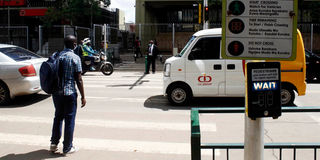Korean firms to install Sh6.5bn smart traffic lights in Nairobi

A man crosses the zebra crossing with a smart street light.
Rollout of the capital’s Sh6.5 billion smart traffic lights project has moved a step closer, with the Kenya Urban Roads Authority (Kura) tapping the services of a consortium of Korean firms led by Cheil Engineering Company Ltd.
The consortium will be tasked with leading the implementation of the first phase of the project, which also involves junction improvement.
Under the Sh548 million deal, the contractor will design the project, build a traffic management centre (TMC), provide assistance during bid evaluation, negotiation, and supervision of detailed engineering as well as support the preparation of operation and maintenance.
The project seeks to ease congestion on city roads, with the system designed to allow for a longer period of traffic flow from roads with the most vehicles, a departure from the current time-based system, which mainly relies on traffic marshals.
Also Read: Has NMS lost its development spark?
It will also promote road safety and enhance urban mobility, Kura Director-General Silas Kinoti said. He added that bidding for the main contract, which involves improvement of 21 junctions and putting up a fully-equipped TMC, is expected to start in August.
Helping save time
“The entire project is expected to cost Sh6.5 billion and is funded by the Economic Development Cooperation Fund through Export-Import Bank of Korea,” Mr Kinoti said.
The second phase will involve junction improvement and installation of intelligent transport system (ITS) facilities at 81 intersections. This should start later in the year.
Kura has successfully implemented an ITS pilot project at 10 junctions on Western Ring Road and Ngong Road, which has greatly reduced traffic snarl-ups.
The model has proved effective in managing traffic and removing the need for traffic police at intersections and helping commuters, motorists and pedestrians to save time by planning their movements based on real-time traffic data.
A 2017 report by Numbeo ranked Nairobi as having the second worst gridlocks globally, with commuters spending 55.8 minutes in traffic, leading to an estimated loss of Sh58 million daily.
To cure this, the system allows users to access prior information about traffic and seat availability on the bus rapid transit system, which cuts commuter travel time, enhancing safety and comfort.
Using artificial intelligence, ITS uses cameras and variable timing traffic lights linked to a control centre to observe and control traffic, easing police officers’ load.
A good balance
This is by monitoring the city traffic, discerning the general traffic conditions and obtaining traffic flow data in real-time using intelligent algorithms to allow longer traffic flow from roads with the most traffic and less time where there are fewer vehicles, thus creating a good balance by minimising unnecessary waiting time.
The system also provides a mobile electronic police system to enable flexible monitoring of roads. The TMC can identify traffic law violation spots, thus augment police efforts in enforcing traffic rules and regulations for safer roads and in fighting crime.





